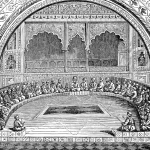This liberal idea of equality has been repeatedly subjected to criticism. The civic republicanism that had been pushed aside by liberalism first responded by objecting that the ‘freedom of the ancients’ must not be sacrificed on the altar of the ‘freedom of the moderns.’ In fact, classical liberalism threatened to reduce the meaning of equal ethical liberties to a possessive-individualist reading of individual or ‘subjective’ rights misinterpreted in instrumentalist terms. In doing so, it failed to do justice to an important normative intuition that also merits respect under modern social conditions, namely, the requirement of solidarity that unites not only relatives, friends, and neighbors in a private sphere, but also citizens as members of a political community beyond purely legal relations. Individual liberties tailored to the business transactions of private property owners and to the religious conscience and allegiance of private individuals constitute the core of a liberal legal system. This reading pointed to the narrow ‘egoistic’ interpretation of ethical freedom that continued to echo in the polemic of the young Marx against the American and French declarations of rights. The objection that individual freedom is not exhausted by the right to a utilitarian ‘pursuit of happiness’ and hence cannot be reduced to the authorization to the private pursuit of temporal and spiritual goods.
Jürgen Habermas, Between Naturalism and Religion. trans. Ciaran Cronin (Malden, MA: Polity Press, 2009), 272-3.
















